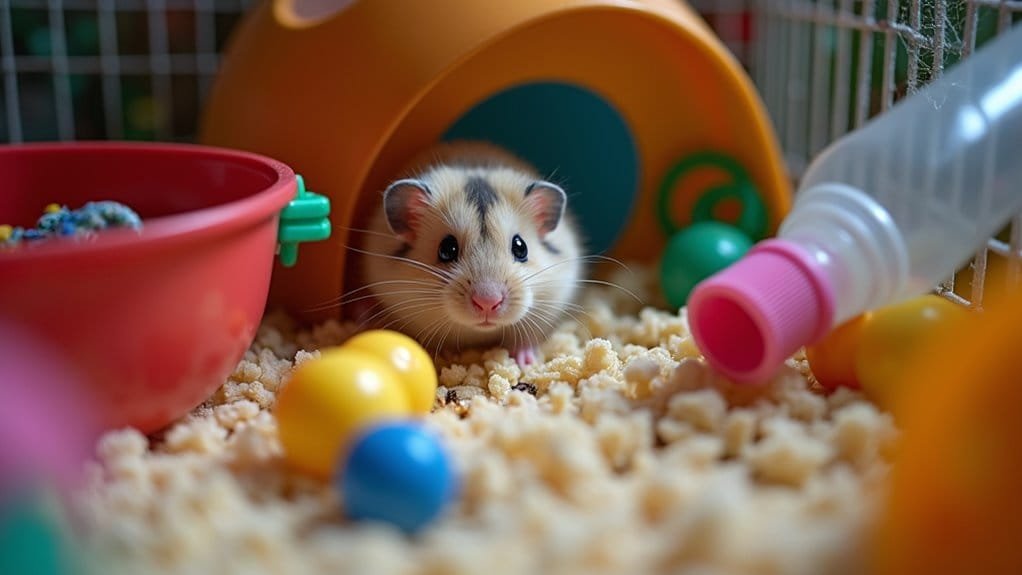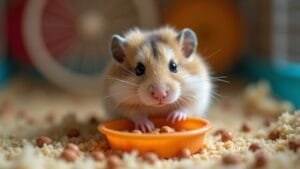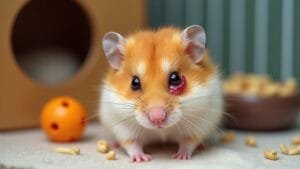So, you’re a new hamster owner, huh? That’s super exciting! But hold on—don’t make some rookie mistakes! Make sure their cage is big enough and has deep bedding for burrowing. And please, no chocolate or onions; stick to veggies! Handle them gently and let them get used to you first—no sudden movements! Keep their space clean but familiar. And don’t forget exercise! A good wheel or fun tunnels keeps them healthy and happy. Think of it like giving them a mini amusement park! Wanna know more key tips to nail hamster care? Just stay with me!
Cage and Environment Issues
When setting up a home for your new hamster, the cage and environment play a crucial role in their well-being. You wouldn’t want to live in a closet, right? Hamsters feel the same way. Make sure the cage is at least 8 inches for dwarf hamsters and 10 inches for Syrians. If it’s too small, they can get stressed, and nobody wants a grumpy hamster!
Now, let’s talk about bedding. If it’s less than 8 inches deep, your little buddy can’t burrow like they love to do. And steer clear of pine shavings or newspaper—those can be harmful! Instead, go for something safe and cozy. A multi-chamber hideout is a must, too; it keeps things clean and gives them a place to chill. Additionally, ensure that your cage size is appropriate to avoid stress and behavioral issues that can arise from confinement.
Don’t forget maintenance! Spot clean daily to keep odors away, and please, no harsh chemicals. You wouldn’t want to live in a smelly, unsafe home, would you?
Diet and Nutrition Errors
A hamster’s diet is a critical aspect of their health and happiness, yet many new owners make common mistakes that can lead to serious issues.
You wouldn’t want a friend constantly munching on junk food, right? Hamsters feel the same way!
Here are some diet errors to avoid:
- Inadequate Food Variety: A mix of hamster pellets, fresh fruits, and veggies is key. Don’t just stick to one type of food! A balanced diet supports energy levels and digestive health.
- Inappropriate Human Food: Seriously, no chocolate or onions. They’re toxic! Stick to safe treats like small bits of carrot or apple.
- Overfeeding: It’s tempting to fill their bowl, but too much food can lead to obesity. Set a feeding schedule and stick to it!
Handling and Socialization Blunders
Handling and socializing your new hamster can be a rewarding experience, but it’s easy to make mistakes that can create stress for both you and your pet. Imagine bringing your little furball home and immediately trying to snatch it up—yikes! Your hamster needs time to settle in, just like you’d in a new place.
Avoid waking them suddenly; they’re not fans of surprises, and it could lead to bites or screams. Additionally, it’s important to remember that hamsters are nocturnal, so handling them during their active hours ensures a more positive interaction.
When you do handle your hamster, remember to use both hands for support. Think of it like cradling a tiny football—secure and gentle! Also, let your hamster approach you. Ignoring their boundaries won’t win you any points.
Remember, slow and steady wins the race. Rushing socialization can scare them away faster than a cat chasing a laser pointer.
And hey, observe their body language! If they seem stressed, back off. Handling them during their active hours is key, too. Just like you wouldn’t want to be woken up for a dance party, they need their rest.
Keep it calm, consistent, and fun, and soon enough, you’ll have a little buddy who loves to hang out with you!
Bedding and Cleaning Oversights
Creating a comfortable environment for your new hamster goes hand-in-hand with how you handle them. One big area to focus on is bedding and cleaning. You don’t want your furry friend sniffing around in a dusty mess! Here are three common mistakes to avoid:
- Bedding Choices: Stay clear of sawdust or fluffy stuff like cotton wool. They can cause respiratory issues or worse, entangle your little buddy! Use aspen shavings or kiln-dried pine instead—they’re safe and comfy.
- Cleaning Frequency: Don’t overdo it! Spot clean weekly, but save deep cleaning for every 1.5 to 2 months. Your hamster needs its familiar smells to feel secure, so don’t disrupt their nest unless it’s wet. This is particularly important because hamsters rely on scent marking for navigation and territory recognition.
- Cleaning Methods: Use soapy water to clean the cage, but skip the harsh disinfectants. Rinse it well, too! A lingering scent might send your hamster into a tailspin.
Exercise and Health Mistakes
Many new hamster owners overlook the importance of exercise and health, which are crucial for your pet’s well-being.
Imagine trying to run a marathon on a wheel that’s too small! That’s what it feels like for your hamster. Make sure you get a wheel that’s at least 13.8 inches in diameter. Syrian hamsters especially need larger wheels to keep their spines straight and healthy.
And let’s talk about exercise balls. Sure, they look fun, but they can be dangerous! Hamsters can get stressed or even hurt if they bump into furniture or roll down stairs. Always supervise your little buddy when they’re in one of those balls. Supervision during playtime is important to prevent accidents.
Also, don’t forget about variety! Just like you wouldn’t want to eat the same meal every day, your hamster craves different activities, too. Tunnels, stairs, and climbing toys help keep them happy and engaged.




